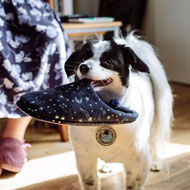
Lily-Rose helps her owner’s mother with tasks around the home
A self-taught assistance dog has been honoured for saving her owner’s life and helping out with tasks around the home.
Lily-Rose, an eight-year-old Papillon crossbreed, saved her owner Jenny Deakin from choking to death and alerted her when her mother collapsed. She also helps out with essential household chores, such as picking up items and assisting with the laundry.
Animal charity Blue Cross this week presented Lily-Rose with its historic Blue Cross Medal for exceptional animal achievement.
“With the Blue Cross Medal we want to celebrate the amazing things pets do for us and how they change our lives,’ explained Blue Cross chief executive Sally de la Bedoyere. “Lily-Rose is a perfect example of this and we’re honoured to award her with this medal, we also hope her story encourages more people to see the potential of rescue pets.”
Jenny Deakin added: “I owe my life to Lily but it isn't what she has done for me that made me nominate her for the Blue Cross Medal, it is what she does for my mum on a daily basis. She takes care of her every day, gives my mum her independence and gives me peace of mind that I can leave for work every day.”
Adopted at four-months-old, Lily-Rose helps Jenny’s mother, who suffers from arthritis, cope with everyday life. This can include anything from taking off socks, to using the washing machine or picking up the remote control.
One night, Lily-Rose even woke Jenny up by barking and pawing to let her know that her mother had collapsed.
“Mum said she started getting chest pains and then the next thing she had woken up on the floor, we went to the hospital where it turned out my mum had had a heart attack,” she said. “Without Lily waking me I may not have found my mum in distress. She is a true life-saver and I’m delighted she’s been awarded the Blue Cross Medal.”
Image (C) Blue Cross.



 The latest
The latest